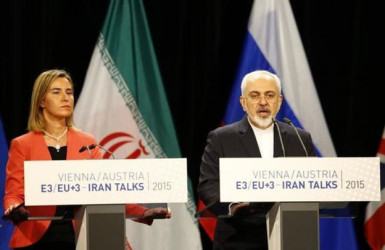ANKARA, (Reuters) – Iranian President Hassan Rouhani said yesterday the nuclear deal reached between Tehran and major world powers this month will help fight terrorism and bloodshed in the Middle East, Iran’s state TV reported.

Foreign Minister Mohammad Javad Zarif also cited wider effects of the deal, saying Tehran and the European Union could now discuss questions “including energy cooperation … human rights, confronting terrorism and regional issues”.
The Iranian leaders spoke during a one-day visit by EU foreign policy chief Federica Mogherini to Tehran to discuss implementation of the deal to curb Tehran’s nuclear programme in return for lifting economic sanctions imposed on the country.
World powers suspected Iran’s nuclear programme aimed to build a nuclear bomb, which Iran denied. Tehran reached the deal on July 14 with the United States, France, Britain, Russia, China and Germany after a standoff lasting more than a decade.
“The agreement will be very important and influential for the future of relations in the region, Europe and the world,” Rouhani told Mogherini. “It will help the fight against terrorism and stop war and bloodshed in the region.”
At a joint news conference with Mogherini, Zarif said they had agreed to hold high-level EU-Iran talks on a wide range of issues including fighting terrorism, state television reported.
After the terms of the agreement were settled, Iran’s Supreme Leader Ayatollah Ali Khamenei said Tehran would not end its support for regional allies, including the Lebanese Hezbollah, Syria’s government and Shi’ites in Bahrain and Yemen.




